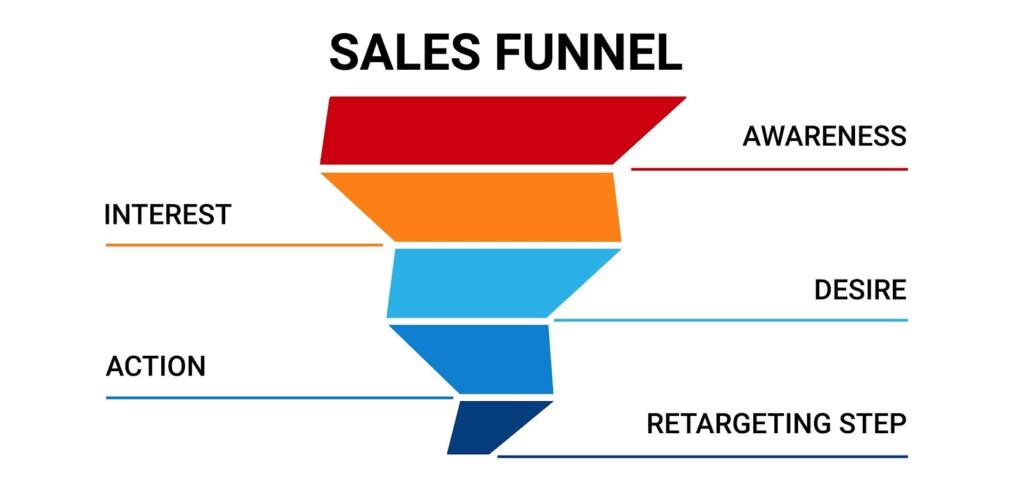“Discover how AI in sales optimization can transform your sales funnel. This guide shows you how SalesCloser AI’s agents boost lead generation, nurture leads, and close more deals.”
The world of sales is constantly changing. Traditional methods often fall short in today’s fast-paced market. This is where artificial intelligence (AI) comes in, fundamentally changing how businesses find, connect with, and close deals. AI enhances every aspect of your sales process, making it more intelligent, more innovative, and significantly more efficient.
This guide will show you how AI can improve each stage of your sales funnel. We will explore the underlying AI technologies, share actionable insights, and reveal how platforms like SalesCloser AI, with its powerful AI agents, specifically support and streamline these processes to drive conversions more effectively.
Why AI in Sales Optimization Matters Now
Sales teams face significant challenges, including handling vast amounts of data, personalizing outreach for hundreds of individuals, and responding quickly to new opportunities. Manual processes struggle to meet these demands, resulting in missed opportunities and wasted effort.
AI steps in to solve these problems. It automates repetitive tasks and analyzes data more efficiently and accurately than any human can. This helps sales teams focus on what they do best: building relationships and closing deals.
The benefits are clear and statistically proven:
- Increased Efficiency & Productivity: According to Deloitte, 33% of AI users reported a significant increase in efficiency and productivity after adoption. AI agents take over repetitive tasks, freeing up your sales team to focus on more strategic tasks.
- Higher Sales and Conversions: Sales professionals who adopted AI have reported a 50% increase in leads and appointments (McKinsey). AI agents help tailor messages, making every interaction more effective and efficient.
- Reduced Operational Costs: Case studies show companies integrating AI tools can achieve a 15% reduction in operational costs and a 20% increase in revenue.
- Better Insights: Get real-time data to make wise, predictive choices, moving from guesswork to certainty.
The Core AI Technologies Transforming Sales
To truly optimize sales, it’s essential to understand the specific AI technologies powering the change.
| AI Technology | Function in Sales |
| Predictive AI | Analyzes historical data to forecast future outcomes, identifying the highest-potential leads and deals most likely to close. |
| Natural Language Processing (NLP) | Enables systems to understand, interpret, and generate human language, powering chatbots, sentiment analysis, and personalized email generation. |
| Generative AI | Creates new, unique content like personalized email copy, sales scripts, product descriptions, and video snippets at scale. |
| Machine Learning (ML) | The foundation of all AI, it uses data to continuously learn and improve algorithms without explicit programming (e.g., constantly refining lead scores). |
Step-by-Step AI-Driven Sales Funnel Optimization
Optimizing your sales funnel with AI involves thoughtful planning and execution. Each stage presents unique opportunities for AI to add significant value.

Stage 1: Defining Your Ideal Customer Profile (ICP) with AI Agents
Before you sell, you need to know who you are selling to. AI makes defining your Ideal Customer Profile (ICP) much more precise by moving beyond market research and guesswork.
How AI Agents Help:
- Data Analysis: AI agents process vast datasets—comprising past customer interactions, successful sales, and retention rates—to identify patterns that human analysts may miss.
- Predictive Modeling: SalesCloser AI’s agents build predictive models that forecast which new leads are most likely to become your ideal, most profitable customers. They consider hundreds of variables simultaneously, giving you a highly refined target.
- Dynamic ICP Adjustment: Markets change, and your ICP may need to adjust accordingly. AI agent systems continuously learn from new data and suggest real-time adjustments to ensure your targeting stays sharp.
Stage 2: Automating Lead Generation and Qualification with AI Agents
Lead generation and qualification are often time-consuming and manual. AI agents automate the heavy lifting in finding and vetting leads, saving SDRs countless hours.
How AI Agents Help:
- Lead Sourcing & Intent Signals: AI agents scour the internet, social media, and industry databases to find companies matching your ICP. They look for intent signals (e.g., downloading a competitor’s white paper or visiting pricing pages) that indicate a prospect is ready to make a purchase.
- Lead Qualification and Scoring: This is where AI agents shine. Instead of manual checks, they automatically:
- Behavioral Scoring: Track website visits, email opens, and content engagement, assigning a dynamic score based on buying intent.
- Fit Scoring: Compare lead data against your ICP.
- SalesCloser AI’s Role: SalesCloser AI’s agents automatically sift through millions of online profiles, identifying and scoring prospects based on their online activity and engagement. They integrate with intelligent chatbots on your website to perform initial qualification 24/7, ensuring your team only focuses on highly qualified leads.
Stage 3: Personalized Outreach at Scale with AI Agents
Generic messages rarely work—personalization is key. AI agents enable hyper-personalized communication without requiring your team to write each message from scratch.
How AI Agents Help:
- Content Generation: Generative AI agents draft personalized email subject lines, body copy, and social media messages. They pull in data points about the prospect, such as their industry, role, recent company news, or past interactions.
- Dynamic Messaging: AI agents adjust messaging in real-time based on prospect behavior.
- SalesCloser AI’s Role: SalesCloser AI’s agents use advanced NLP and Generative AI to craft bespoke outreach sequences that resonate with specific individuals. This scales the human touch, boosting open rates and reply rates far beyond what traditional templates can achieve.
Stage 4: Closing Deals Faster with Predictive AI and Sentiment Analysis
As leads enter the pipeline, AI shifts from identifying prospects to managing and closing deals.
How AI Agents Help:
- Sales Forecasting: Using Predictive AI, agents analyze historical data, market trends, and current lead engagement to create more accurate sales forecasts. This enables managers to make more informed strategic decisions and allocate resources more effectively, thereby reducing their reliance on guesswork and improving overall efficiency.
- Sentiment Analysis (Voice & Text): AI agents use NLP to analyze the tone, pitch, and keywords in sales calls and email chains.
- They look for warning signs, such as prolonged inactivity or negative sentiment.
- An agent can alert the sales representative if a deal appears to be in trouble, allowing for proactive intervention before the deal is lost.
- CRM Data Automation: SalesCloser AI’s agents integrate seamlessly with your CRM. They automate administrative tasks, such as logging calls, updating lead scores, and scheduling follow-ups. This frees up human resources to spend more time building relationships and closing deals.
Stage 5: Post-Sale Optimization and Lifetime Value (LTV)
AI doesn’t stop once the deal is closed. It works to nurture relationships, increase retention, and predict future revenue.
How AI Agents Help:
- Churn Prediction: AI agents monitor customer usage data and support interactions to identify customers at risk of leaving (churning). SalesCloser AI’s agents can trigger proactive engagement campaigns or flag them for a personal check-in.
- Upsell & Cross-Sell Suggestions: Agents analyze a customer’s usage and past purchases to suggest the most relevant, complementary products, maximizing customer lifetime value.
Real-World AI in Sales Success
These examples demonstrate the proven impact of AI-powered sales strategies across various industries:
- Amazon (Cross-Selling): Amazon’s recommendation engine, powered by Machine Learning, analyzes billions of transactions to suggest complementary or upgraded products. These hyper-personalized recommendations account for roughly 35% of the company’s total revenue.
- Sephora (Email Personalization): Sephora implemented an AI-driven email marketing system to personalize customer communications based on browsing and purchase history. This resulted in a 25% increase in click-through rates compared to traditional campaigns.
- Unilever (Predictive Forecasting): Unilever utilizes Predictive AI to integrate historical sales data with external factors, such as weather and local events, to more accurately forecast product demand. This sales intelligence has led to a 10% increase in forecast accuracy, optimizing inventory and reducing costs.
Key Considerations for Implementing AI Agents in Your Sales Funnel
Integrating AI, primarily through specialized AI agents, into your sales process is not just about adopting new tools—it requires a strategic approach.
- Data Quality is Paramount: AI agents are only as good as the data they learn from. Ensure your data is clean, accurate, and comprehensive. Invest time in data hygiene.
- Human-AI Agent Collaboration: Remember, AI agents enhance human capabilities; they do not replace them. Your sales team must understand how to work with AI agents, interpreting insights and leveraging the tools effectively.
- Continuous Optimization: AI models need constant monitoring and refinement. Review performance metrics regularly, and update your AI agents’ training data as your market or product evolves.
- Security and Privacy: Ensure your AI agent solutions comply with all data security and privacy regulations (e.g., GDPR, CCPA) when handling customer data.
Avoiding Common Pitfalls
When using AI agents, watch out for certain traps:
- Over-reliance on Automation: Don’t automate everything without human oversight. Some interactions still need a human touch.
- Ignoring Human Feedback: Your Sales Team Has Valuable Insights. Use their feedback to refine AI agent models and processes.
- Lack of Integration: Siloed AI agent tools won’t deliver full value. Ensure your AI agent solutions integrate with your existing CRM and marketing platforms.
- “Set It and Forget It” Mentality: AI is not a one-time setup. It needs ongoing tuning and optimization to remain effective.
- Poor Training Data: Feeding flawed or biased data to your AI agents will likely yield suboptimal results. The principle of “Garbage in, garbage out” applies strongly to AI.
The Future of Sales: A Hybrid Approach
The most effective sales teams of the future will use a hybrid approach. AI agents handle data analysis, repetitive tasks, and preliminary interactions, while human sales professionals focus on complex negotiations, relationship building, and strategic decision-making. This combination leads to powerful synergy.
AI agents streamline the process, bringing qualified leads to human reps. They provide insights to help those reps close deals. This frees up human sales talent to focus on high-value activities where emotional intelligence and creativity are essential. This partnership truly drives conversions and ensures sustainable growth.
Ready to Transform Your Sales?
AI is not just the future of sales; it is a present reality for organizations driving measurable results. Don’t get left behind—SalesCloser AI’s agents are designed to streamline, personalize, and optimize every step of your sales journey.
Discover How Our AI Agents Can Revolutionize Your Business.
Try an AI Agent now | Book a Tailored Demo
FAQs About AI in Sales Funnel Optimization
Q1: What exactly is AI-driven sales funnel optimization?
A: It’s using artificial intelligence tools and techniques to improve each stage of your sales process. This includes finding leads, qualifying them, nurturing them, and closing deals. AI agents, such as those offered by SalesCloser AI, automate tasks, personalize interactions, and provide data-driven insights, making the entire sales funnel more efficient and effective.
Q2: How do AI agents help with lead generation?
A: AI agents help by automating the search for potential customers. They sift through vast amounts of data online. They identify people or companies that match your ideal customer profile (ICP). They also look for “intent signals,” which are actions that indicate a prospect may be interested in making a purchase. This significantly reduces manual work.
Q3: Can AI agents personalize outreach messages?
A: Yes. AI agents analyze data about each prospect. This enables them to craft highly personalized messages, whether in an email, a social media post, or even a chatbot interaction. They can tailor content, offers, and even the timing of messages to resonate with each individual, making your outreach much more impactful.
Q4: Do AI agents replace human sales representatives?
A: No, AI agents do not replace human sales reps. Instead, they act as powerful assistants. AI agents handle repetitive tasks, analyze data, and identify opportunities for improvement. This frees up human reps to focus on what they do best: building relationships, handling complex negotiations, and providing a human touch during the sales process. It’s about human-AI agent collaboration for maximum efficiency.
Q5: How do AI agents help in lead nurturing?
A: AI agents automate the delivery of relevant content to leads over time. They can set up automated email sequences or content recommendations based on a lead’s behavior and interests. An AI agent can trigger further personalized follow-ups if a lead engages with specific content. This keeps your brand at the forefront of your potential customers’ minds and moves leads closer to being ready to make a purchase.
Q6: What kind of data do AI agents need for sales optimization?
A: AI agents perform best with high-quality, comprehensive data. This includes customer relationship management (CRM) data, marketing automation data, website analytics, social media data, and other information about prospects and customers. The more data you feed them, the cleaner that data is, the better and more accurate the AI agents’ insights will be.
Q7: How can I measure the success of AI agents in my sales funnel?
A: You can measure success by tracking key performance indicators (KPIs). These include conversion rates (from leads to opportunities, and from opportunities to sales), sales cycle length, lead-to-opportunity ratio, sales team efficiency, customer retention rates, and average deal size. Compare these metrics before and after implementing AI agents to see the impact.
Q8: What are some common challenges when implementing AI agents in sales?
A: Common challenges include ensuring data quality (poor data leads to poor AI agent performance), integrating AI agent tools with existing systems, training sales teams to use AI agents effectively, and overcoming resistance to change. It’s also important to manage expectations and understand that AI agents require ongoing optimization.
Q9: How do AI agents help with sales forecasting?
A: AI agents analyze historical sales data, market trends, and current lead engagement. They use this information to create more accurate sales forecasts. This helps sales managers make more informed decisions regarding resource allocation, goal setting, and strategic planning. It reduces reliance on guesswork and provides a data-backed outlook.
Q10: Can AI agents identify which deals are at risk of not closing?
A: Yes, AI agents can monitor the “health” of open deals. They look for warning signs such as prolonged inactivity, negative sentiment in communication, or changes in prospect behavior. An AI agent can alert the sales representative if a deal appears to be in trouble. This allows them to intervene proactively and get the deal back on track, potentially preventing lost sales.the sales funnel stage by stage and see how AI, primarily through SalesCloser AI’s agents, transforms each one.






